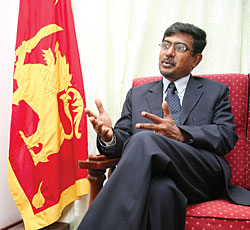 MIN RATNA BAJRACHARYA |
"I became close to Mr Prachanda in the past two years, and I found in him a real determination to see the peace process to its conclusion and to develop the country," Nakandala told Nepali Times before leaving for his new job as Sri Lanka's deputy high commissioner in London.
He admitted to feeling highly emotional as he made his farewell call on newly elected Prime Minister Pushpa Kamal Dahal on Sunday morning, realising what an historic period he had witnessed in Nepal's modern history.
Coming from a country where violence is again increasing following the collapse of the 2002 ceasefire, Nakandala welcomed what he saw as a genuine commitment among Nepal's political forces for peace and reconciliation. "Nepal has evolved its own model based on diversity and pluralism and it can be a showcase for the world," he said.
Nakandala said the second main reason for his emotional attachment to Nepal was that it was the birthplace of the Buddha. During his stay here, he visited Lumbini 15 times, often accompanying Sri Lankan ministers and dignitaries.
But he said the 34,000 Sri Lankan pilgrims who visit Lumbini each year?more than from any other country?are often disappointed by the lack of decent accommodation and other visitor facilities at the site, so most of them end up making brief day trips.
Nakandala said his greatest regret was not being able to start a regular Sri Lankan Airlines flight between Kathmandu and Colombo. Despite two bilateral meetings, talks broke down over the number the passengers the airline could carry between Kathmandu and Delhi. The Sri Lankans wanted 700 seats a week to make the route viable, while the Nepalis wouldn't budge on 500.
However, it was Nakandala's deft diplomacy that helped save last month's SAARC summit in Colombo which he said came close to being cancelled because of the delay in Nepal naming a prime minister. His own hectic, last-minute lobbying ensured a Nepali head of government attended?even if only a caretaker prime minister.
"It was touch and go till the last moment," Nakandala recalled. "But the bottom line was that the summit had to be held." At the time, the Maoists demanded that the summit be postponed, but Nakandala said Dahal bore him no hard feelings today.
To this Sri Lankan diplomat, South Asians share a common culture and similar moral values. "We are not different, we are the same," he said. "We have the resources and wisdom to strive for a better common future for our peoples."
He said his inspiration came from the Buddha's teachings to replace selfishness and pettiness with compassion and generosity?qualities he found in abundance in Nepal.
Asked for his enduring memory of Nepal, Nakandala replied: "The people, the simplicity of the Nepali people, the complete lack of arrogance from the top leadership right down to ordinary people. I leave a bit of my heart here."
Kumar Acharya


